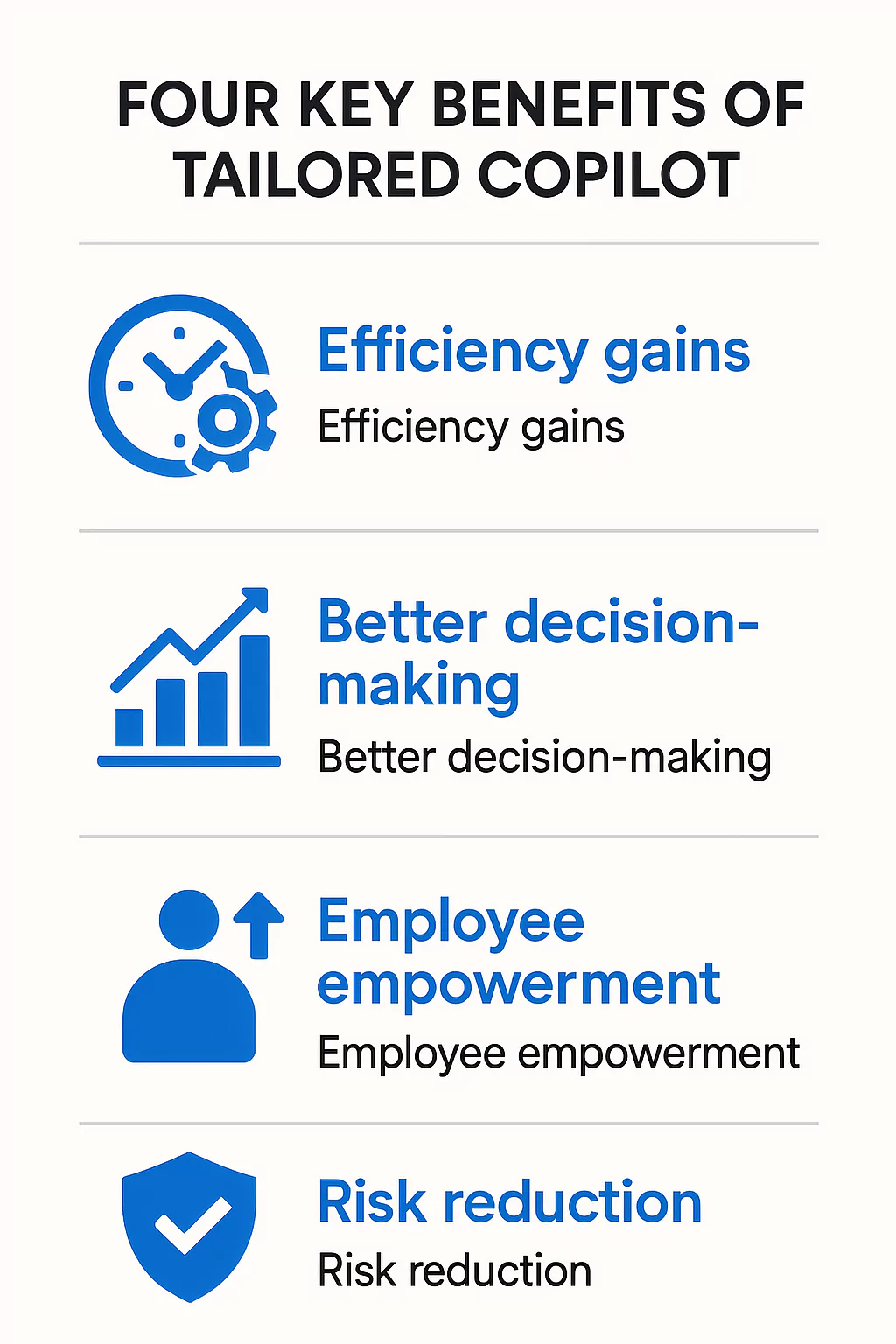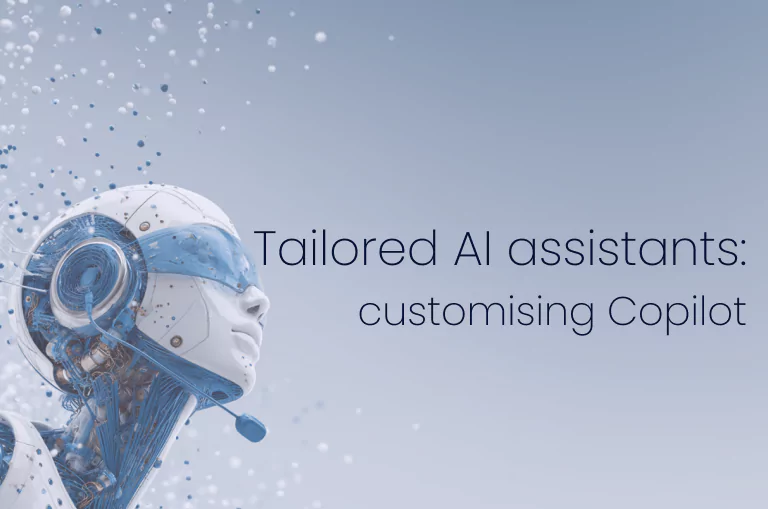Tailored AI assistants: customising Copilot for your organisation
- 5 min read
From generic to tailored AI
Artificial intelligence assistants are becoming a staple of modern workplaces. Microsoft Copilot has gained strong adoption because it integrates directly into tools people already use daily, from Outlook and Teams to Dynamics 365. According to Microsoft’s Work Trend Index, 70% of Copilot users say it makes them more productive.
Yet many organisations quickly realise that an off-the-shelf assistant cannot always handle the specifics of their sector or workflows. A finance team might need different insights than a retail sales team. A professional services firm will not gain much from generic automation if it cannot draw from its own project documentation.
This is where tailored AI assistants come in. By customising Copilot to align with business needs, leaders can bridge the gap between generic AI and meaningful, organisation-wide value.
Why customisation matters for Copilot
Copilot is powerful by design, but its real strength lies in how it can be extended. Tailoring means embedding business context processes, terminology, and trusted data into the assistant so it supports unique ways of working.
For example, Dynamics 365 Copilot can be tuned to highlight sector-specific KPIs or integrate with custom CRM fields. Azure OpenAI enables organisations to bring in proprietary knowledge bases. Microsoft Fabric provides a data layer that ensures Copilot queries reflect accurate, governed information.
By personalising Copilot in this way, companies can move from generic task automation to contextualised assistance that reflects how their teams actually operate. Synonyms such as personalised, contextual, and organisation-specific capture the essence of this shift.
The business value of tailored AI assistants
The investment in tailoring Copilot pays back in measurable benefits.
-
Efficiency gains - Automating repetitive processes, from drafting client emails to preparing weekly reports, saves employees hours every week.
-
Better decision-making - Drawing on reliable internal data sets reduces guesswork and improves the quality of recommendations.
-
Employee empowerment - Staff can use Copilot directly within the applications they already know, lowering adoption barriers.
-
Risk reduction - Enterprise-grade governance and compliance features in Microsoft’s ecosystem provide confidence in how data is used.
Evidence backs up these claims. A Harvard Business School study found that generative AI can improve worker performance by up to 40% on certain tasks. For decision-makers, this translates into meaningful productivity uplift without expanding headcount.

Real-world scenarios across sectors
Tailored Copilot is not a theoretical promise - organisations are already applying it in practical contexts.
-
Retail - A customised Copilot within Dynamics 365 Sales can generate personalised product recommendations for account managers, based on purchase history and seasonal demand.
-
Manufacturing - Integrated with Microsoft Fabric, Copilot can summarise supply chain data, flagging potential bottlenecks and suggesting corrective actions before delays cascade.
-
Professional services - In Outlook and Teams, Copilot can generate draft proposals or summarise lengthy client correspondence, freeing consultants to focus on higher-value advisory work.
At ARP Ideas, we have seen firsthand how tailoring Copilot can transform processes. In client projects, the most significant impact often comes from connecting Copilot to domain-specific data sets. Once the assistant “speaks the language” of the business, trust and adoption rise sharply.
Addressing challenges and misconceptions
As with any technology shift, concerns surface around cost, complexity, and reliability.
Common misconceptions
-
“Customisation means huge expense.” In reality, tailoring Copilot often builds on existing Microsoft licences. The main effort is aligning the assistant with data and workflows, which can be scoped to business priorities.
-
“Generic AI is good enough.” Without contextual awareness, assistants risk producing vague outputs that employees do not trust. Adoption suffers if the AI cannot handle the nuances of a role.
Practical challenges
-
Data quality - An assistant is only as effective as the information it can access. Organisations need governance to ensure Copilot surfaces accurate results.
-
Change management - Employees may hesitate to adopt AI tools. Training and transparent communication are essential for confidence.
A comparison helps clarify the difference:
| Aspect | Generic AI assistant | Tailored Copilot |
|---|---|---|
| Data sources | Public or limited | Organisation-specific, governed data |
| Relevance of outputs | Generalised | Contextual to workflows and sector |
| Trust and adoption | Variable | Higher, as results reflect familiar processes |
| Governance and security | Basic | Enterprise-grade, aligned with compliance needs |
Looking ahead: the future of tailored Copilot
Customisation today is only the beginning. Copilot will continue to evolve in ways that make tailoring even more powerful.
Adaptive AI models are being developed to learn from an organisation’s context while staying within safeguardrails. Microsoft is expanding industry-specific data models in the Microsoft Cloud for sectors such as healthcare, finance, and manufacturing. These will enable faster deployment of Copilot assistants that understand sector language out of the box.
For innovation leads and CTOs, the key message is clear: Copilot should be seen not as a static tool but as a platform. When approached strategically, it becomes a foundation for continuous innovation across functions - from HR to operations to client services.
Key Takeaways
-
Tailored Copilot bridges the gap between AI potential and business reality.
-
Customisation ensures outputs are relevant, trusted, and aligned with business goals.
-
Organisations gain efficiency, stronger decision-making, and employee empowerment.
-
Challenges exist around data quality and change management but can be addressed with planning.
-
ARP Ideas has the expertise to design, implement, and support customised Copilot deployments.
Frequently asked questions
Is tailoring Copilot only for large enterprises?
No. Mid-sized businesses often benefit even more, as tailored assistance helps teams scale without increasing headcount.
How long does it take to implement a tailored Copilot?
Timeframes vary. Smaller scope projects can be delivered in weeks, while complex integrations may take a few months.
What about data privacy?
Copilot inherits Microsoft’s enterprise-grade security and compliance standards, ensuring sensitive data stays within governed boundaries.
Does Copilot replace employees?
No. Copilot is designed to augment human work, reducing manual tasks so employees can focus on strategy and innovation.
Conclusion and next steps
Generic assistants offer convenience, but organisations seeking real business transformation should consider tailoring Copilot. With the right data, context, and support, the assistant becomes a trusted partner rather than just a productivity add-on.
At ARP Ideas, we specialise in helping organisations unlock this value by aligning Microsoft Copilot with sector-specific needs. If you are ready to explore how a tailored assistant could reshape your workflows, get in touch with our experts.


